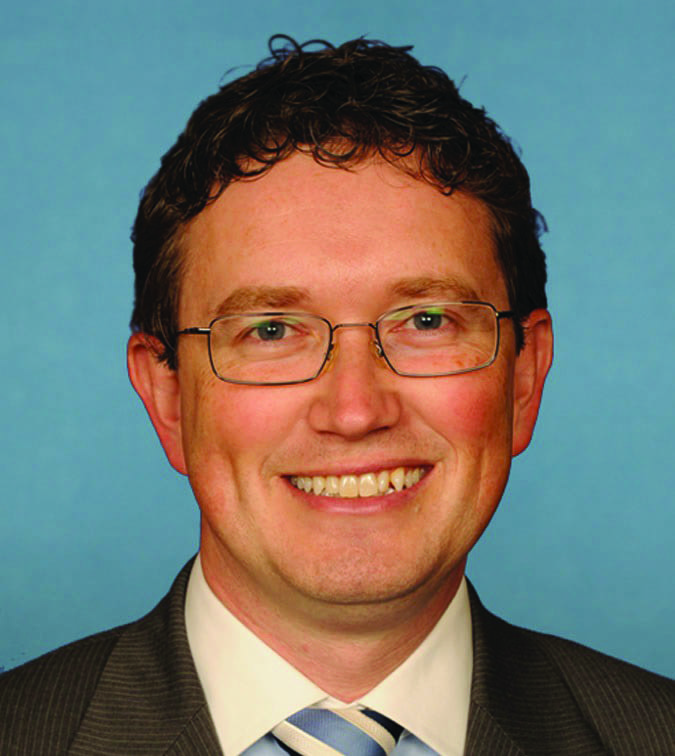FOR IMMEDIATE RELEASE

Congressman Thomas Massie from Kentucky since 2012 [read his Bio and stance on farming] Congressman Massie will be the keynote speaker at the Food Freedom Conference on August 14, 2015. See white paper. For more info, call 703-208-3276 or email [email protected] |
Falls Church, Virginia—July 23,2015—Today, Representatives Thomas Massie (R-KY) and Chellie Pingree (D-ME) introduced House Bill H.R. 3187, a bill that would significantly increase access to locally produced meat for consumers around the country. H.R. 3187, also known as the PRIME Act (the Processing Revival and Intrastate Meat Exemption Act), would return power to the states to determine appropriate regulations on meat processing for local sales.
The PRIME Act would give states the option of passing laws to allow the sale of custom slaughtered and processed meat in intrastate commerce direct to the consumer as well as to venues such as restaurants, hotels, or grocery stores that deal directly with consumers. Interstate sales or multi-step distribution chains would not be allowed.
Currently, federal law prohibits the sale of custom processed meat; the meat from a custom facility can only go to the individual or individuals who owned the animal at the time the slaughter took place, meaning that the customer(s) must buy the whole animal while it is still alive. Farmers who sell meat by the cut must use a slaughterhouse that has an inspector on-site during the actual slaughtering; in many areas of the country, this means hauling the animals for several hours to a distant facility, increasing expenses for the farmer and creating greater stress on the animals.
Attorneys for the Farm-to-Consumer Legal Defense Fund (FTCLDF) worked on the bill with Massie’s staff.
“Until 1967, states were able to set their own regulations for meat processing,” explained FTCLDF President Pete Kennedy. “The Wholesome Meat Act of 1967 was sold to the public as a consumer protection bill, but it has wound up being an industry consolidation measure. Between 1967 and 2015, we lost more than 70% of the slaughterhouses in this country, severely reducing options for small farmers.”*
Demand for locally produced beef outstrips production in the U.S., in part, because of the lack of access to inspected slaughterhouses. Currently, only four companies control over 80% of the beef processing in this country; four companies control over 60% of pork processing.1 Inspected slaughterhouses are stretched beyond capacity and the number of meat and poultry recalls has skyrocketed in recent years.
“The PRIME Act is the first step to rebuilding local processing infrastructure, which can revive rural economies and enable communities to become more self-sufficient in meat production,” stated Kennedy. “We applaud Representative Massie for taking on one of the bigger obstacles to a prosperous local food system.”
Original co-sponsors of the PRIME Act include Representatives Walter Jones (R-NC) and Jared Polis (D-CO).
—————–
1 Heffernan, W. & Hendrickson, M. (2007). Concentration of agricultural markets. University of Missouri, Department of Rural Sociology. http://www.foodcircles.missouri.edu/07contable.pdf [view PDF]
*Editor’s Note (2/25/16): quote correction and removed the ending statement, “And while there were 15,000 non-federally inspected slaughterhouses in 1967, today there is only a small fraction of that number.”
YOUR FUND AT WORK
 Services provided by FTCLDF go beyond providing legal representation for members in court cases.
Services provided by FTCLDF go beyond providing legal representation for members in court cases.
Educational and Political Action Services also provide an avenue for FTCLDF to build grassroots activism to create the most favorable regulatory climate possible. In addition to advising on bill language, FTCLDF supports favorable legislation via action alerts, social media outreach, and the online petition service.
You can help FTCLDF by becoming a member or donating today.

 Anyone wanting to make a contribution to support the work of FTCLDF can make a donation online or send a check to:
Anyone wanting to make a contribution to support the work of FTCLDF can make a donation online or send a check to:
FTCLDF
8116 Arlington Blvd, # 263
Falls Church, VA 22042
Prefer to make a tax-deductible donation? Contact us by email at [email protected] or call 703-208-FARM (3276). Thanks for your support.